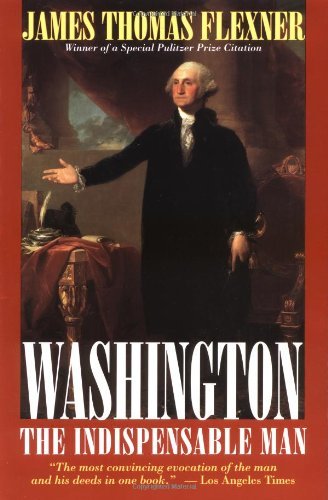
Washington: The Indispensable Man
Book Description
A reluctant leader emerges from the shadows of revolution to shape a nation. "Washington: The Indispensable Man" captures the raw tension and monumental choices faced by George Washington as he navigates the treacherous waters of war, politics, and personal sacrifice. Each decision ignites a ripple of consequence, pulling him deeper into a struggle between loyalty and ambition. This gripping portrait unveils a man whose courage and integrity carved the very foundation of America, leaving an indelible mark on history. As the stakes rise and allies falter, what price must one pay to secure freedom for a fledgling nation?
Quick Book Summary
"Washington: The Indispensable Man" by James Thomas Flexner offers an intimate portrait of George Washington's evolution from a hesitant soldier to the defining figure behind the formation of the United States. Flexner reveals the internal and external pressures Washington faced as he led the Continental Army, presided over the Constitutional Convention, and served as the new nation's first President. The biography highlights Washington's moral courage, dedication to the cause of liberty, and steadfastness amidst betrayals and political chaos. Through detailed historical narration, Flexner uncovers the personal sacrifices Washington endured, the pivotal choices that shaped his legacy, and the profound sense of responsibility that drove him. The book dispels myths to reveal the complex, human leader who truly was indispensable in uniting and guiding the fledgling country.
Summary of Key Ideas
Table of Contents
The Reluctant Leader's Moral Compass
The biography opens on Washington's rise not out of personal ambition, but from a profound sense of civic duty. Flexner explores his early military setbacks and gradual mastery as a strategist, emphasizing the humility and self-doubt that defined his leadership style. As the Revolution erupted, Washington was thrust into command of the Continental Army, earning respect through resilience and unyielding commitment to independence. The narrative delves into how Washington balanced his reluctance to seize power with the awareness of his indispensable role in the cause.
Forging a Nation in War and Peace
As the Revolutionary War intensified, Washington's leadership was tested by constant shortages, internal dissent, and shifting alliances. Flexner provides insights into Washington's strategic patience—enduring long winters with weary troops and persisting through political turmoil in Congress. The reader sees how his ability to inspire loyalty and maintain discipline became crucial, particularly during crises like Valley Forge and the eventual victory at Yorktown, where Washington's vision and steadfastness were pivotal.
Navigating Political Division and Betrayal
Following independence, the fragile new nation faced daunting problems. Washington's stature helped bring order, as he presided over the Constitutional Convention and used his influence to guide debates toward a balanced federal system. Flexner illustrates Washington's internal struggle to balance power and liberty, wary of becoming a monarch but keenly aware that only strong, principled leadership could unify the states and legitimize the emerging government. The book explores the nuances of compromise, patience, and vision Washington brought to these foundational years.
Personal Sacrifice for Public Good
Washington's presidency was fraught with partisanship, foreign pressure, and the challenge of setting precedents for a republic without historical parallels. Flexner examines how Washington's choices—like the neutrality policy, the establishment of the cabinet, and stepping down after two terms—became guiding traditions for American governance. The biography highlights personal sacrifices, including Washington's yearning for private life, as he endured criticism and intrigue to put national interests above his own.
Legacy of Leadership and Character
In its final analysis, the book underscores how Washington's legacy transcends military exploits or political maneuvering. Flexner draws a portrait of character—integrity, perseverance, and a steadying influence that steered a divided people toward unity and democracy. The biography asserts that Washington was not merely a symbolic figure but truly the indispensable man, whose humanity, moral strength, and willingness to set aside personal gain made the revolutionary experiment of America possible and enduring.
Download This Summary
Get a free PDF of this summary instantly — no email required.





